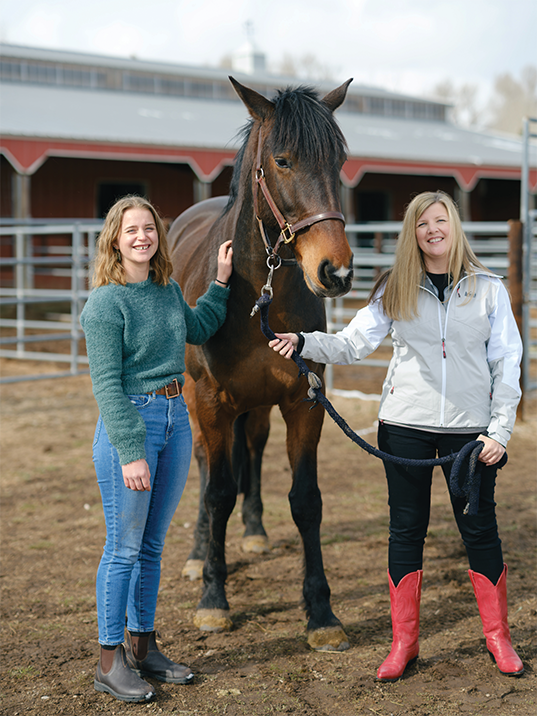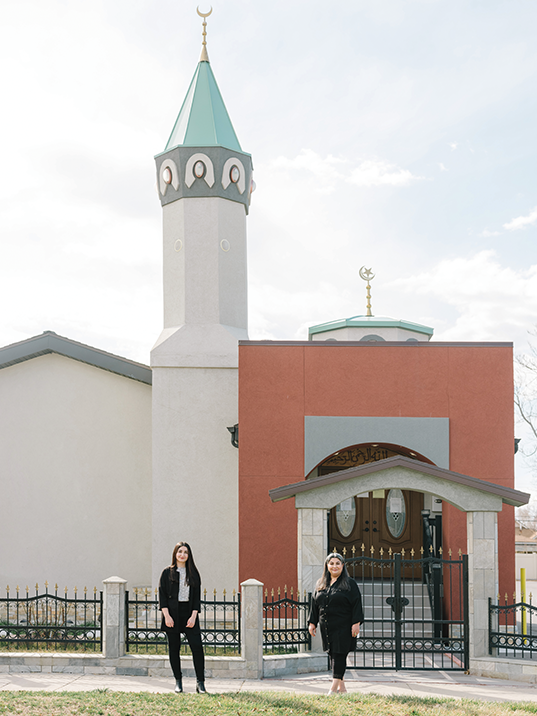
Erin Cutshall needed help. She had just bought the Koelle Institute for Equus Coaching, a life-skills coaching company, and was set to publicize her services. But the COVID-19 pandemic punched a big dent in her business, which as the name implies incorporates horses with life coaching.
Talking with clients in the presence of a horse “helps to get people out of their comfort zone and opening up about personal issues,” says Cutshall BS’96. The company’s success depends on in-person contact, and some potential clients were leery about face-to-face sessions, even though they are conducted outdoors and in line with physical distancing guidelines.
An email from the Utah Small Business Development Center put Cutshall back in the saddle. The missive included an announcement about Hope Corps, a new program run through the U offering help to small businesses and nonprofits struggling through the pandemic in the form of summer virtual internships from college students.
Through the Hope Corps, marketing major and major horse lover Claire Hurty came to Equus’ rescue. Hurty learned about the program through a social media post from the David Eccles School of Business and jumped at the chance to begin using the skills she’d learned in her classes.
“With the pandemic, I knew I wouldn’t have a ton of opportunities to begin working in the real world, and I wanted to help a small business affected by COVID-19,” she says. Working with horses—albeit virtually—appealed to the former summer camp counselor. “Equus Coaching seemed like a cool job.”
Cutshall had more than 11 years of experience as a life skills coach, but when it came to developing a marketing plan, she needed a lifeline. “Claire and I started brainstorming ideas about how to use various platforms to market myself,” Cutshall says. “I wanted to create a brand and told her, ‘I really want to make videos, but I don’t know how consumers would use and view them.’ Claire came back with the answers.”
Hurty helped develop a social media strategy for Equus Coaching, including a total reorganization of its website. For example, every Monday, the site posts pictures of a different horse; Wednesdays, it features a bio of one of the company’s coaches; and on Fridays, it shares a session or a course offering.
“I learned a lot about leadership and what it takes to build a community.”
The Hope Corps internship was a great learning experience, Hurty says. “It gave me a greater understanding of what I’d be doing if I had a job in marketing. I learned a lot about leadership and working independently. And I really felt good helping someone improve their business.”
Hurty says that doing all her work virtually was not a problem. “For sure, I definitely missed in-person contact, but we were able to work around that.”
Creating Hope
As the saying goes, hope is often born from adversity. This was the case in March 2020, when Clark Ivory BA’88, chief executive officer of Ivory Homes and founder of the Clark and Christine Ivory Foundation, reached out to Taylor Randall HBA’90, dean of the David Eccles School of Business. The two were concerned about how COVID-19 lockdowns were affecting students and harming small businesses and nonprofit organizations.
“We were in the eye of the storm of the pandemic and talked about how we could help Utah weather the storm,” Ivory remembers. “I said, ‘What we need is our own version of the Peace Corps.’ We needed to take our students who are suffering and give them the opportunity to contribute to the community at a time when they’re most needed.”
Sixty years ago, President John F. Kennedy organized the Peace Corps to empower students by having them serve in developing areas and spread goodwill around the world. Since its inception, more than 235,000 Americans have volunteered in 141 countries.
Hope Corps went on to become an extension of the Utah Health & Economic Recovery Outreach (HERO) Project, whose goal was to keep people informed about COVID-19 and help in the state’s fiscal recovery.
To fund Hope Corps, Ivory and Randall reached out to groups including the Boyer Company, Utah Community Builders, and Latter-day Saint Charities. In the meantime, information about the project was disseminated on social media platforms, and interested students began applying. The program is shepherded by the U's Eccles School and the Salt Lake City Chamber of Commerce and has now expanded to eight other colleges and universities around the state.
In summer 2020, some 220 students were enrolled in the program, and most participants were paid hourly for their work, says Morgan Lyon Cotti BA’01, associate director of the Hinckley Institute of Politics. Another 110 students secured internships in fall 2020 and spring 2021 and received scholarships between $2,000 and $3,000. So far, dozens of organizations have been helped.
“Our business and university leaders were concerned that small businesses—especially businesses owned by people from underrepresented groups in our community—were falling through the cracks and needed assistance to help them through the economic crisis,” Lyon Cotti says. “For our students, the goal was to provide them with transformative internships where they would learn to build networks and gain leadership skills.”
The internships took place via Zoom, which at first gave some businesses pause. “We told potential employers that if they needed support setting things up, we were there to step in and help,” says Katie Abby, assistant dean of business career services and corporate outreach at the Eccles School.
One of Hope Corps’ success stories is the company Brownies, Brownies, Brownies, a Salt Lake City bakery with a knack for making every kind of the goodie you can imagine. The business faltered with the onset of pandemic restrictions, but a Hope Corps intern found a way to keep the baked goods seller afloat. “The intern helped the company remain viable through the pandemic by talking to bakeries, setting up curbside pickup, arranging distribution to brick-and-mortar stores, and coordinating sales to coffee shops,” Abby says. “It’s just so rewarding to see students find a job and get started on their careers.”
Ivory echoes that sentiment. “We feel gratified to support businesses and give students the opportunity to gain real-life experience by helping businesses get through this time of crisis. And who knows? Maybe they’ll draw on this experience when, years from now, they’re running their own businesses.”
“We hope to continue the program,” adds Lyon Cotti. “The future focus of the Hope Corps will really emphasize assisting businesses and nonprofits that are operated by or serve underrepresented populations.”

Community Involvement
The student interns haven't just helped small businesses; they've also logged countless hours for nonprofits and impacted the community in big ways.
Case in point: Shayma Salih BS’20, a psychology major who worked at the Utah Muslim Civic League and helped organize community outreach programs.
“The Muslim Civic League is a really special cause to me,” Salih says. “The Muslim population here is underserved, and many in the community don’t know how to access their services. We helped several small Muslim-owned businesses in the area that were affected by the pandemic secure loans to stay afloat. We cherish these businesses, and helping them was amazing.”
In addition to videoconferencing with small business owners, Salih played a key role in energizing several impactful civic engagement projects, such as initiating a voter registration campaign and helping to open the first polling place in a Salt Lake City-area mosque, at the Khadeeja Islamic Center.
Another project involved reaching out to people to make sure they understood and filled out census forms.
“Many local Muslims have been American citizens for 10 or more years, yet they had never voted,” Salih says. And when it comes to government forms, “There’s a stigma among immigrants around filling out government forms. Many people in the refugee population are scared of them, because they think they’re here illegally, even though they are lawful citizens. We had to convince them that myth was not true.”
And as if that wasn’t enough, Salih created Project Rahma (“Project Peace”), a digital literacy class that also functions as a youth mentorship program. Salih’s stint with Hope Corps was a win-win—she made a positive impact in the community, and the work experience made a great impact in her life.
“The internship helped me find my passion for working with nonprofit agencies and how they impact underserved communities,” she says. “I learned a lot about leadership skills and what it takes to build a community. And now I’m using those skills in my new job, as the community coordinator for University of Utah Health.”
Luna Banuri, executive director of the Utah Muslim Civic League, says Salih did “an amazing job. She was very good at penetrating different communities and spreading our message by encouraging people to get involved and be civically engaged.”
If there is a common theme within the ranks of Hope Corps’ student army, it’s that nothing beats knowing you’ve impacted people’s lives in a positive way. Ashmita Shanthakumar, an English and political science double major, found her time at the United Way of Salt Lake tutoring at-risk students online made her want to dedicate her career to working for nonprofits. “I saw how my work really made a difference,” she says. “One of the kids I worked with passed his math class after failing several times. That made me feel really good.”
Cutshall says Hurty was a terrific resource that helped keep her business afloat during tough times. “She was very professional, and I’d love to keep in touch with her,” she says. And when it was safe to do so, she adds, there was a horse named Elton (see photo) waiting to thank her with a gentle nuzzle.
About the author: Benjamin Gleisser is a Toronto-based freelancer.



Comments
Comments are moderated, so there may be a slight delay. Those that are off-topic or deemed inappropriate may not be posted. Your email address will not be published. Required fields are marked with an asterisk (*).